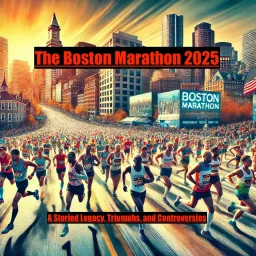Boston Marathon 2025

The Boston Marathon is one of the most prestigious and oldest long-distance running events in the world, drawing elite athletes and amateurs alike. It has become an indelible part of sports history, symbolizing endurance, determination, and community. However, with its rich history comes a series of controversies that have sparked important conversations about inclusivity, safety, and fairness in the sporting world. A Storied History: Origins and Evolution The Boston Marathon’s origins can be traced back to the revival of the modern Olympic Games in 1896. Following the success of the marathon in Athens, the Boston Athletic Association (BAA) sought to create an event that would bring the excitement of marathon racing to the United States. The first Boston Marathon was held on April 19, 1897, with 15 participants racing a 24.5-mile course from Ashland to Boston. John J. McDermott was the inaugural champion, crossing the finish line in a time of 2:55:10. In 1924, the course was extended to its current 26.2 miles to conform with Olympic standards. Over the decades, the Boston Marathon grew in popularity and significance, cementing its reputation as one of the most competitive marathons in the world. Unlike many other major marathons, the Boston Marathon has stringent qualifying standards based on age and gender, making it an event where participation itself is a badge of honor. The race is held annually on Patriots' Day, a holiday observed in Massachusetts to commemorate the battles of Lexington and Concord, which marked the start of the American Revolutionary War. The marathon is not just a sporting event but a cultural celebration in Boston, symbolizing the spirit of perseverance, community, and athleticism. Triumphs and Milestones The Boston Marathon has been home to some of the most remarkable achievements in marathon history. In 1966, Roberta Gibb made history by becoming the first woman to unofficially complete the marathon. Gibb had to hide in the bushes near the start line because women were not officially allowed to compete at the time. Her participation broke barriers and challenged the status quo. A year later, in 1967, Kathrine Switzer became the first woman to officially run the Boston Marathon. Despite an attempt by race officials to physically remove her from the course, Switzer persisted and finished the race, becoming a symbol of gender equality in sports. In 1986, the Boston Marathon became the first marathon in the world to offer prize money, further elevating its status and attracting top-tier international athletes. That same year, the course record was shattered by Robert Cheruiyot of Kenya, ushering in an era of Kenyan dominance that continues to this day. Another iconic moment occurred in 2014, when Meb Keflezighi, the first American to win the race since 1983, crossed the finish line. His victory was particularly poignant as it came just a year after the tragic 2013 Boston Marathon bombing, where two explosions near the finish line killed three spectators and injured hundreds. Keflezighi’s win was seen as a moment of triumph and healing for the city of Boston. Controversies That Shaped the Marathon Despite its rich history, the Boston Marathon has not been without its share of controversies. Many of these have sparked broader discussions about inclusivity, fairness, and the responsibilities of race organizers. One of the earliest controversies involved the exclusion of women. Prior to 1972, women were not allowed to compete officially in the Boston Marathon. Roberta Gibb’s and Kathrine Switzer’s defiant participation highlighted the inequality, eventually leading to women’s inclusion in the race. In 1972, the Boston Marathon officially allowed women to enter, and since then, female participation has grown exponentially. Another significant controversy arose with the question of mobility-impaired athletes. The inclusion of wheelchair athletes has been a topic of debate over the years. In 1975, Bob Hall became the first wheelchair athlete to complete the Boston Marathon within the qualifying time of three hours, prompting the race to officially include a wheelchair division. Hall’s perseverance opened the door for athletes with disabilities, and today, the wheelchair division is one of the most exciting aspects of the race, featuring fierce competition and remarkable performances. However, the Boston Marathon’s reputation took a hit in 1980 when Rosie Ruiz was disqualified after it was revealed she had not run the entire race. Ruiz initially crossed the finish line as the first female finisher but had skipped several miles of the course. The scandal called into question the integrity of marathon results and led to stricter oversight and monitoring during races. In recent years, the marathon has also faced controversies surrounding the qualification process. The race’s strict qualifying times have made it a prestigious event, but they have also led to frustration among runners who narrowly miss the cutoff times. The growing popularity of the marathon has caused the BAA to adjust qualifying times multiple times to accommodate more runners. These changes have prompted debates about whether the race should focus on exclusivity or accessibility. The 2013 Bombing and Its Aftermath One of the darkest chapters in Boston Marathon history came in 2013, when two bombs exploded near the finish line, killing three people and injuring more than 260 others. The bombings were a calculated act of terrorism that sent shockwaves throughout the world. The event, which is typically a joyous celebration of athleticism, was marred by tragedy and fear. In the aftermath, the marathon became a symbol of resilience and unity. The following year, in 2014, the Boston Marathon returned with increased security measures and a heightened sense of solidarity. More than 36,000 runners participated, including many who had been unable to finish the previous year due to the bombing. “Boston Strong” became the rallying cry for the city, and the marathon has since continued to honor the victims and survivors of the attack. Boston Marathon’s Place in the Modern Running World Today, the Boston Marathon remains one of the most prestigious and sought-after races in the world. Its stringent qualifying times, deep-rooted traditions, and elite competition draw runners from across the globe. For many athletes, qualifying for and running the Boston Marathon is a lifelong dream and a symbol of achievement. In recent years, the marathon has made strides toward becoming more inclusive and environmentally conscious. The BAA has worked to reduce the race’s carbon footprint by implementing sustainability measures, including reducing waste and promoting greener practices. Additionally, efforts have been made to increase diversity among participants and promote equity in the sport of long-distance running. When Does Registration Begin? For runners hoping to participate in the Boston Marathon, securing a spot in the race is a competitive process. The marathon’s strict qualifying standards mean that not all runners who meet the qualifying times will be accepted. In fact, in recent years, the number of applicants has exceeded the number of available spots, leading to a rolling admission process that gives preference to runners who exceed their qualifying times by the largest margins. Registration for the Boston Marathon typically opens in mid-September, with qualifying times based on age and gender. For the 2024 Boston Marathon, registration began on September 11, 2023, and remained open for several days, depending on how quickly the race filled up. Runners are encouraged to check the official Boston Athletic Association website for the most up-to-date information on registration, qualifying times, and entry procedures. The BAA also offers charity entries for runners who do not meet the qualifying standards but wish to raise funds for one of the marathon’s many charitable partners. Conclusion: Boston Marathon’s Enduring Legacy The Boston Marathon’s place in sports history is undeniable. From its humble beginnings in 1897 to its status today as a global sporting event, the marathon has become synonymous with endurance, perseverance, and triumph. While controversies have occasionally marred its reputation, the marathon has emerged stronger and more inclusive over time. The Boston Marathon is more than just a race; it is a celebration of the human spirit. Every April, runners from around the world come together to test their limits, compete at the highest level, and share in the sense of community that the marathon fosters. Whether running for a personal best, to honor a loved one, or simply to experience the magic of the Boston Marathon, participants are part of a storied legacy that continues to inspire and endure. Thanks for listening and remember to like and share wherever you get your podcasts.































